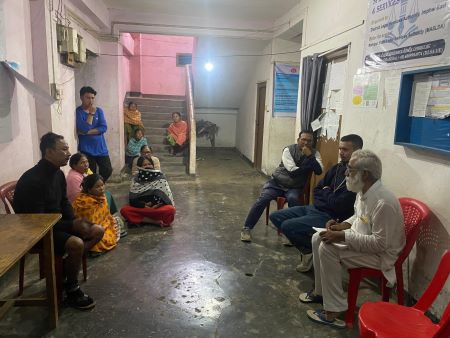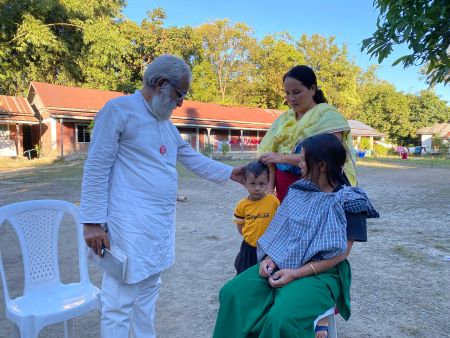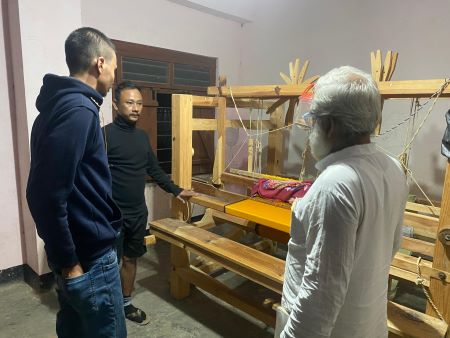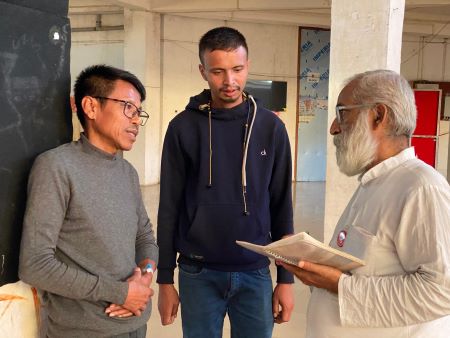Sandeep Pandey’s Insights from Ground Zero on Rebuilding Lives and Bridging Divides in Manipur’s Conflict Zones
The Socialist Party (India) visited five relief camps in Imphal from 11-12 November and has made several recommendations, appealing to both communities to renounce violence and pave the way for dialogue. A copy of the recommendations was sent to the Deputy Commissioner of Imphal (West and East Manipur) and the Directorate of Health Services, Manipur.
According to Magsaysay winner Sandeep Pandey: “We visited relief camps at Phayeng High School, Manipur Trade and Export Centre in Lamboikhongnangkhong, Biramangol College Hostel in Sawombung on 11/12/24, and Samurou Government High School and Pravabati College in Mayang Imphal on 12/12/24. Based on our visit, we have the following recommendations.”

Sandeep Pandey speaking with inmates at the Biramangol College Hostel Relief Camp in Sawombung, Imphal West.
There is a discrepancy in cash and supplies given to inmates in relief camps. At Phayeng High School, they have received Rs. 1,000 five times since arriving at the camp. At the Manipur Trade and Export Centre, they get Rs. 80 per day per head, twice a month. At Biramangol College Hostel, people who have lost their homes to arson receive Rs. 80 per day per head, while those whose houses remain undamaged get only Rs. 10 per day per head.
At Samurou Government High School, inmates only receive rice from the government, whereas at other camps, they also get dal, potatoes, onions, oil, soap, detergent, shampoo, etc. Inmates here receive Rs. 80 per head per day and have also received Rs. 1,000 five times during festivals. Inmates at Phayeng High School also get eggs two to three times a week and milk daily. However, at other camps, milk and eggs are not provided.
At Pravabati College relief camp, inmates receive only Rs. 15 per day per head for breakfast. In all camps except the Manipur Trade and Export Centre, there are common kitchens managed by inmates on a rotational basis. These common kitchens use wood as fuel, whereas inmates at the Manipur Trade and Export Centre use induction stoves.
No one has been compensated for the loss of houses or businesses, despite many promises in the past. Recently, the Chief Minister promised the camp inmates Rs. 1,000 each before the Ningol Chakkouba festival, but no one received the money.
While other relief camps allow families to stay together, even if crowded in one room, Pravabati College has a dormitory arrangement where men and women stay separately. Many people are weary of living in relief camps and want to return to their villages/homes.

Sandeep Pandey at the Phayeng High School Relief Camp with the son of Leichongbam Ibemcha, who was killed in her village, Imphal West.
A particularly tragic case is that of Phayeng High School’s camp, where their village, Kangchup Chingkhong, is just 1 km away. Yet, when 39-year-old Leichongbam Ibemcha attempted to return in November 2023, she was shot and died ten days later. Efforts should be made to restore normalcy as soon as possible so people can go back. They wish to resume their traditional occupations, such as agriculture and sand mining.
Women at Pravabati College complained that government officials have promised them sewing machines and other items for income generation several times, but these promises have not been fulfilled. Only once was there a training session for mushroom cultivation, but there was no follow-up support to start the activity.
The local community has provided three handlooms for the women to use at the relief camp, while the government has provided four at Biramangol College Hostel in Sawombung. There is a need for at least 15 more handlooms. At Phayeng, women make plastic bags and candles, but they require marketing support. More needs to be done to provide livelihood opportunities for women in relief camps.
Women in Phayeng are deeply concerned about their children’s education. They save money by selling some of the supplies provided by the government, sometimes going hungry or forgoing soap to afford their children’s school fees.
The children of inmates in relief camps should be admitted under Section 12(1)(c) of the RTE Act for free education in private schools, or the government should compensate their education expenses. Alternatively, as at the Pravabati College relief camp, where a certificate issued by the relief committee allows nearby private schools to educate inmates’ children for free, the government should instruct all private schools to do the same.

Inmate Vimal Kh. displaying a handloom provided by the government for women to work on at the Relief Camp in Sawombung.
In most camps, doctors visit, though the frequency varies. A common complaint is that they do not bring medicines. Parents must take their children to the nearest Primary Health Centers (PHCs) for vaccinations. In emergencies, there are no ambulances available to transport inmates to local hospitals. Many inmates also lack Ayushman cards, which would enable them to access treatment in private hospitals.
Most inmates do not have ration cards. Providing them with ration cards would help them settle back into their villages and restart their lives.
There is a need for blankets, warm clothing, socks, shoes, and other items in several camps. In the past, blankets were distributed, but only one per family, which is insufficient. At Samurou, there was also a demand for tubs.
Only the Samurou Government High School relief camp prominently displays important contact numbers for Cluster Nodal Officers, CSO/Relief, Police, Revenue, Health/Medical, Education, Water Supply, Electricity, Waste Management, Food and Essential Items, District Control Room, Fire, Anganwadi, and Counseling.
At Biramangol College Hostel, only the numbers for Child Violence (1098), Women’s Violence (181), and Electricity were posted. Essential contacts for Relief, Medical, Water-Sanitation, Mental Health, Law and Order, Emergency Services (fire, etc.), and Veterinary services should be prominently displayed at all camps.
 The situation in Manipur has become so complex that a Kuki living in Churachandpur, 60 km south of Imphal, can only leave Manipur by air via Aizawl in Mizoram—a challenging day-long journey on mountain roads that can take up to 17-20 hours. Imagine a pregnant woman taking this route.
The situation in Manipur has become so complex that a Kuki living in Churachandpur, 60 km south of Imphal, can only leave Manipur by air via Aizawl in Mizoram—a challenging day-long journey on mountain roads that can take up to 17-20 hours. Imagine a pregnant woman taking this route.
There is a weekly helicopter service between Churachandpur and Aizawl, but it is not reliable, and such expensive travel is beyond the reach of ordinary people. The constitutional right to freedom of movement is clearly being violated. The ongoing conflict has severely affected ordinary Meiteis and Kukis, many of whom remain in relief camps, facing an uncertain future.
Magsaysay award winner Sandeep Pandey, General Secretary of the Socialist Party (India), stated, “The ongoing violence in the Meitei-Kuki conflict in Manipur is deeply concerning. The alienation between the two communities and the hatred they harbor for each other is unprecedented.
Meiteis cannot leave Manipur by road, as the next district north towards Kohima, Nagaland, is Kangpokpi—a Kuki-dominated area. Young Kuki men and women guard its borders, preventing any Meitei from passing. Thus, Meiteis who wish to leave Manipur must travel by air. Similarly, the Meira Paibis, the Meitei mothers’ organization, bar Kukis from entering Imphal from the opposite direction.”

Inmate Surjeet Konsam speaking at the Manipur Trade and Export Centre Relief Camp in Lamboikhongnangkhong, Imphal West.
“To complicate matters, the security establishment is only adding to the confusion. Recently, Meiteis questioned the Army’s inability to protect citizens, demanding its removal. The Security Advisor to Manipur first stated, based on information from the Chief Minister’s office, that 900 trained Kuki militants armed with sophisticated weapons had entered India, only to retract this later. Such statements from the Chief Minister’s office or the Security Advisor—especially as the Chief Minister has consistently spoken about immigration from across the border altering the state’s demographics—serve only to instill fear among the people. This also raises questions about the security establishment’s role,” Pandey added.
“We are very concerned about the violence, which shows no sign of abating. The alienation and hatred between the two communities are unprecedented, taking a heavy toll on ordinary Meiteis and Kukis, many of whom remain in relief camps facing an uncertain future,” said Sandeep Pandey, General Secretary of the Socialist Party.
“We believe that resolving the conflict between the two communities will require a political dialogue. For any dialogue to happen, peace must first be restored. Both sides need to cease hostilities. Social and political activists from across India will join the march to express concern for Manipur’s situation. We hope that the peace march will encourage voices of reason in Manipur and help reduce mindless violence. We stand for the right of ordinary Kukis and Meiteis to live in peace, justice, and dignity,” he said.
 “To resolve the conflict, a political dialogue is essential. Whether the Meiteis will get Scheduled Tribe status or the Kukis a separate administration are questions for the Union government to address. However, peace must first be established, and violence must end. The fundamental rights of ordinary Kukis and Meiteis to live with peace, justice, and dignity must be upheld,” he added.
“To resolve the conflict, a political dialogue is essential. Whether the Meiteis will get Scheduled Tribe status or the Kukis a separate administration are questions for the Union government to address. However, peace must first be established, and violence must end. The fundamental rights of ordinary Kukis and Meiteis to live with peace, justice, and dignity must be upheld,” he added.
Regarding the role of the Central government, Pandey stated: “If the state were governed by an opposition party, President’s Rule would likely have been imposed by now. Prime Minister Narendra Modi has visited nearly two dozen countries since the violence began on 3 May last year, yet he has not visited Manipur. Apart from a single mention, made only under persistent pressure from the opposition, he has remained silent about the situation in Manipur. We hear he is mediating peace between Russia and Ukraine and that world leaders are seeking his intervention. He also appears to have advice for the Palestinian and Israeli leadership. Yet, he has not shown the same concern for Manipur, despite the continuous appeals of its people. This raises serious doubts about his intentions and highlights an indifferent attitude towards the plight of Manipur.” ![]()
Also Read: ‘WhatsApp’ History: A Clash of Academia and Political Narratives
Disclaimer : PunjabTodayNews.com and other platforms of the Punjab Today group strive to include views and opinions from across the entire spectrum, but by no means do we agree with everything we publish. Our efforts and editorial choices consistently underscore our authors’ right to the freedom of speech. However, it should be clear to all readers that individual authors are responsible for the information, ideas or opinions in their articles, and very often, these do not reflect the views of PunjabTodayNews.com or other platforms of the group. Punjab Today does not assume any responsibility or liability for the views of authors whose work appears here.
Punjab Today believes in serious, engaging, narrative journalism at a time when mainstream media houses seem to have given up on long-form writing and news television has blurred or altogether erased the lines between news and slapstick entertainment. We at Punjab Today believe that readers such as yourself appreciate cerebral journalism, and would like you to hold us against the best international industry standards. Brickbats are welcome even more than bouquets, though an occasional pat on the back is always encouraging. Good journalism can be a lifeline in these uncertain times worldwide. You can support us in myriad ways. To begin with, by spreading word about us and forwarding this reportage. Stay engaged.
— Team PT

